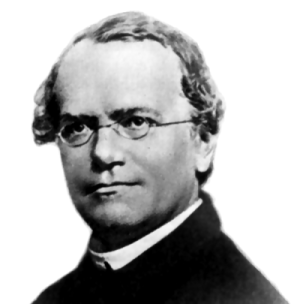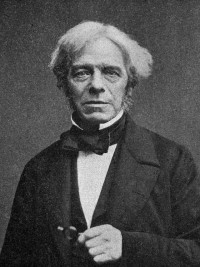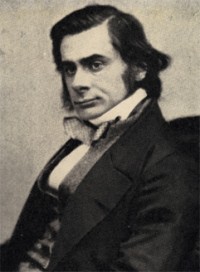Johann Mendel (1822-1884) was an Austrian botanist, now widely regarded as the father of modern genetics. He was given the name ‘Gregor’ – by which he is more commonly known – when he joined the Augustinian monks. It is worth remembering that the idea that all religious people are de facto opposed to science, let alone evolution, is simply incorrect, and Mendel is a reminder that a keen intellect and life in a monastery (the Abbey of St. Thomas) are not exclusive possibilities.
Mendel is most famous for his discovery of the basic principles of genetic heredity through experiments with pea plants (Pisum sativum). Pea plants were good subjects for study because their physical characteristics are relatively few and simple, and fertilisation is easily controlled. Today, Mendel’s findings are ranked amongst the greatest in biology, and our basic understanding of how traits are inherited from one generation to the next comes from the principles he proposed.
In 1865 Mendel presented what would later come to be regarded as a seminal paper in the history of science, Versuche über Pflanzenhybriden (Experiments on Plant Hybridization) to the Natural History Society of Brno in Moravia, and it was published the following year. In it, Mendel laid down three main principles of inheritance:
– Principle of segregation: in diploid species each individual possesses two types of (allele) gene for each trait. A parent will only pass one of these versions onto offspring. The one that gets passed on is in principle random.
– Principle of independent assortment: during gamete formation, each combination of alleles stands an equal chance of occurring.
– Fundamental theory of heredity: discrete units of inheritance are passed from parents to offspring. Today, we call these ‘units of inheritance’ genes.
In the nineteenth century, most biologists believed that offspring inherited a ‘blended’ set of traits from both parents. So, for example, the offspring of a tall man and a short woman would be expected to produce a child of medium height. This didn’t, however, quite add up and notably Charles Darwin had struggled to account for the mechanism by which traits were passed from one generation to the next. Indeed, a coherent theory of heredity was notably absent from On The Origin of Species.
In his 1868 work The Variation of Animals and Plants Under Domestication, Darwin proposed a theory called ‘pangenesis’ which proposed that every cell in the body combined to influence the constitution of offspring. As we now appreciate, this idea was deeply flawed and would eventually be replaced by Mendel’s theory of inheritance, but it highlights just how difficult it was to account for the inheritance of traits in a pre-gene informed world, and as such, how insightful Mendel’s principles proved to be.
In stark contrast to Darwin’s pangenesis theory, Mendel showed that when one variety of pure-bred plant was cross-pollinated with another, the offspring resembled either one or the other of the parent plants; traits were passed from parent to offspring intact, not as a blend of the two. Mendel further demonstrated that some traits are dominant and some are recessive. Dominant traits essentially mask the effect of a recessive trait. By doing so, Mendel highlighted that the subject of inheritance was clearly at one and the same time more complicated and also more simple than had hitherto been suspected by theories propounding ‘blending’. Whilst it is now clear that the processes of genetics are almost infinitely more complex and sophisticated than Mendel could ever have realized, his discovery was the lynch-pin for the emergence of neo-Darwinism.
As pointed out by Henig (2000), even though a reprint of Mendel’s 1866 paper was found in Darwin’s library, it appears that Darwin was unaware of Mendel’s work and may not have even read it. Darwin may not have been impressed. He was already familiar with the work of the French botanist Charles Naudin, who had reached many of the same conclusions as Mendel but without the statistical support.
But it wasn’t just Darwin who failed to pick up on the significance of Mendel’s research; for nearly forty years his 1866 paper remained largely unacknowledged. It was not until after Mendel’s death that his work was re-discovered by the scientific community. In 1900, the botanists Hugo de Vries, Carl Correns and Erich von Tschermak independently published work within a two month span of each other that acknowledged Mendel’s research. Biologists then became interested in the work of this virtually unknown man, and the wider the paper became known, the more scientists of the day wanted to learn about him.
But it has not all been plain sailing; with re-discovery there has also been controversy. Most notably, there has been debate in recent years about whether or not Mendel’s results were artificially modified (not necessarily by Mendel himself, but possibly by an assistant) in order to fit with his expectations, a suggestion which largely stems from Ronald Fisher’s (1936, p.132) assertion that:
“..the data of most, if not all, of the experiments have been falsified so as to agree closely with Mendel’s expectations.”
As is neatly explained by Novitski (2004), most scientists agree that the results from Mendel’s garden pea experiments conform more closely with theoretical expectations (with ratios such as 3:1, 1:2:1 etc.) than one based upon chance, thus arguably making them too good to be true. Since then, many people have studied and replicated Mendel’s garden pea experiments, analysed the outcomes, and debated the ratios. On moral grounds, there is no doubt that Fisher took the ethically and academically correct route by voicing his concerns, but the emerging consensus is that the criticism is unfounded. To quote Fairbanks and Rytting (2001, p.751):
“There is no credible evidence to indicate that Mendel was inaccurate or dishonest in his description of his experiments or his presentation of data. The main questions about his results can be resolved by an appeal to botanical principles and historical evidence.”
As succinctly stated by Tudge (2000, p.286) “..the complexities of modern genetics, and all the ramifications, flow naturally from Mendel’s initial notions..”. In addition, Mendel must be given particular credit for the fact that he formed his hypotheses in an era long before genes had been identified as the unit of inheritance or the structure of DNA had been discovered. He drew his conclusions from observing the evidence in front of him, and that weight of evidence led him to break with orthodoxy and challenge (albeit unacknowledged at first) commonly held perceptions regarding the inheritance of traits. Mendel laid the groundwork that made it possible for us to understand the basic form of genetic inheritance, and in doing so he founded the field of genetics which today has huge benefits for humankind; not least in terms of understanding diseases and developing medicine.
Today we would like to think that new ideas will quickly surface, and certainly given the internet and social networks all this is greatly facilitated. Even so, ideas are ideas and without the fertile soil of an open, curiosity-driven intellect they will wither and die.
Text copyright © 2015 Victoria Ling. All rights reserved.
References
Darwin, C. 1868. The Variation of Animals and Plants Under Domestication. London: John Murray.
Fairbanks, D.J. and Rytting, B. 2001. Mendellian controversies: A botanical and historical review. American Journal of Botany 88 (5), 737-752.
Fisher, R.A. 1936.Has Mendel's work been rediscovered? Annals of Science 1, 115–137.
Hartl, D.L. and Fairbanks, D.J. 2007. Mud sticks: on the alleged falsification of Mendel’s data. Genetics 175, 975–979.
Henig, R.M. 2000. The Monk in the Garden: The Lost and Found Genius of Gregor Mendel, the Father of Genetics. Boston: Houghton Mifflin.
Mendel, J.G. 1866. Versuche über Pflanzenhybriden Verhandlungen des naturforschenden Vereines in Brünn, Bd. IV für das Jahr, 1865. Abhandlungen, 3–47.
Novitski, E. 2004. On Fisher’s Criticism of Mendel’s Results With the Garden Pea. Genetics 166, 1133-1136.
Sandler, I. 2000. Development: Mendel’s Legacy to Genetics. Genetics 154, 7-11.
Tudge, C. 2000. In Mendel’s Footnotes: An introduction to the science and technologies of genes and genetics from the nineteenth century to the twenty second. London: Jonathan Cape.
Vítĕzslav, O. 1996. Gregor Mendel: The first geneticist. Oxford, New York, Tokyo: Oxford University Press. (Translated by Stephen Finn)







